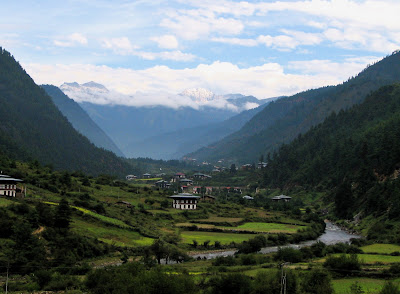Eric Weiner, in his book: "Geography of Bliss", wrote about how happiness was a policy in Bhutan, the city which he explores and compares it to Shangri-La. The latter was a " place of eternal peace wher poets muse... a remote place, cut off from the horrors of the outside world, though not from its tactile comforts (Weiner 50)." As he arrived to Bhutan he was received with the upmost in hospitality, as Weiner says: " the Bhutanese were never colonized, never conquered, so their hospitality is served straight up, devoid of the gratuitous deference and outright ass-kissing so common in this part of the world (51)."
Weiner speaks of the Gross National Happiness. This is Bhutan's national policy which seeks to measure progress by how happy–or unhappy– the bhutanese are in general. This is related also to the idea that the bhutanese believe in reencarnation (the belief that when you die you become reborn as someone, or something else). Since you are coming back as another being you would like to be treated well.
We can see in this narration that the bhutanese are, overall, happy: their life expectancy increased from 42-64 years of age, free health care, free education, and its the world's first nation to become a non smoking nation. Gross National Product is a measure of a nation's progress. Bhutan challenges this notion as it clearly demonstrates that it has progressed considerably.


I believe Bhutan is more of a peaceful place than a happy one. It depends on what observation it's based on.
ReplyDeleteI agree with the comment above. I think mainly, they are okay. Not great, but who really is? And an okay life is fine, like the author realizes at the end.
ReplyDelete